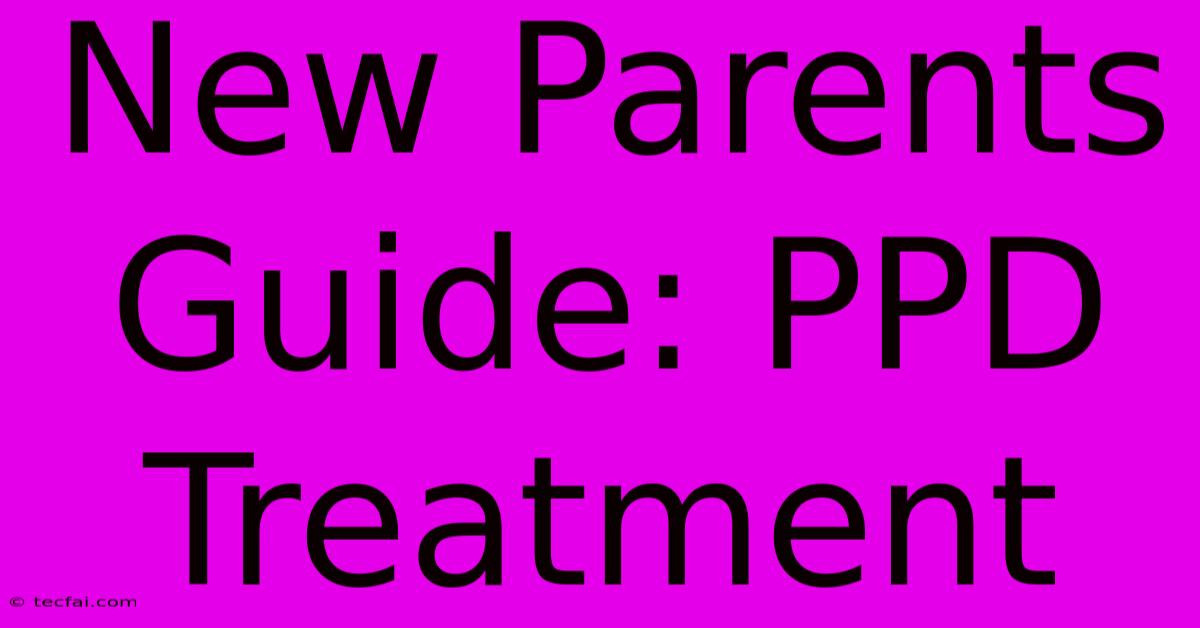New Parents Guide: PPD Treatment

Discover more detailed and exciting information on our website. Click the link below to start your adventure: Visit Best Website tecfai.com. Don't miss out!
Table of Contents
New Parents Guide: PPD Treatment
Congratulations on your new arrival! The early days of parenthood are a whirlwind of joy, exhaustion, and—for many—a surprising struggle with postpartum depression (PPD). This guide is designed to help new parents understand PPD, its symptoms, and most importantly, the available treatment options. It's crucial to remember you are not alone, and seeking help is a sign of strength, not weakness.
Understanding Postpartum Depression (PPD)
Postpartum depression is a serious mood disorder affecting many mothers (and some fathers) after childbirth. It's more than just the "baby blues"—a common experience of mood swings and tearfulness in the first few days postpartum. PPD involves persistent feelings of sadness, hopelessness, and anxiety that significantly interfere with daily life. While the exact causes are complex and not fully understood, hormonal shifts, sleep deprivation, and the immense stress of caring for a newborn are contributing factors.
Common Symptoms of PPD:
Persistent sadness or low mood Loss of interest or pleasure in activities Feelings of hopelessness, worthlessness, or guilt Irritability, anger, or anxiety Sleep disturbances (insomnia or excessive sleeping) Changes in appetite (increased or decreased) Fatigue or low energy Difficulty concentrating or making decisions Thoughts of self-harm or harming the baby (seek immediate help if experiencing these) Withdrawal from friends and family
Seeking Help: Treatment Options for PPD
Recognizing the symptoms of PPD is the first step towards recovery. Many effective treatment options are available, and it's important to find what works best for you.
1. Therapy: A Cornerstone of PPD Treatment
- Cognitive Behavioral Therapy (CBT): CBT helps identify and challenge negative thought patterns contributing to depression. It teaches coping mechanisms to manage stress and improve mood.
- Interpersonal Therapy (IPT): IPT focuses on improving relationships and communication skills, addressing interpersonal issues that may exacerbate PPD.
- Support Groups: Connecting with other mothers experiencing similar challenges can provide invaluable emotional support and a sense of community.
2. Medication: When Therapy Alone Isn't Enough
In some cases, medication may be necessary to manage the symptoms of PPD. Antidepressants, particularly selective serotonin reuptake inhibitors (SSRIs), are commonly prescribed. It's crucial to discuss medication options with your doctor and carefully monitor for any side effects. Remember that finding the right medication and dosage can take time.
3. Lifestyle Changes: Supporting Your Mental Well-being
While not a replacement for professional treatment, lifestyle changes can significantly support recovery:
- Prioritize Sleep: Even short periods of uninterrupted sleep can make a difference. Enlist help from your partner, family, or friends.
- Nourish Your Body: Eat nutritious meals and stay hydrated.
- Gentle Exercise: Even a short walk can boost your mood and energy levels. Consult your doctor before starting any new exercise regime.
- Mindfulness and Relaxation Techniques: Practices like meditation or deep breathing can help manage stress and anxiety.
- Social Support: Connect with supportive friends and family. Don't isolate yourself.
Reaching Out: Finding the Right Support
Don't hesitate to reach out for help. Talking to your doctor, a therapist, or a trusted friend or family member is a crucial step. Many resources are available to support new parents struggling with PPD:
- Your Obstetrician or Gynecologist: They can provide initial assessment and referral to specialists.
- Your Pediatrician: They can offer support and guidance.
- Mental Health Professionals: Therapists and psychiatrists specializing in perinatal mental health can provide personalized treatment plans.
- Postpartum Support International: This organization offers a wealth of information and resources.
- Local Support Groups: Search online for postpartum support groups in your area.
Remember: You Are Not Alone
PPD is a treatable condition. With the right support and treatment, you can recover and enjoy the precious moments of parenthood. Don't suffer in silence. Reach out for help today. Your well-being and the well-being of your family are paramount.

Thank you for visiting our website wich cover about New Parents Guide: PPD Treatment. We hope the information provided has been useful to you. Feel free to contact us if you have any questions or need further assistance. See you next time and dont miss to bookmark.
Featured Posts
-
Which Daughter Is Like Serena Williams
Dec 03, 2024
-
Infection Control Drives Coatings Market
Dec 03, 2024
-
Economists Government Extending Recession
Dec 03, 2024
-
Davids Hot Streak Perfect Timing
Dec 03, 2024
-
Pagbabago Sa Presyo Ng Gasolina At Diesel
Dec 03, 2024
